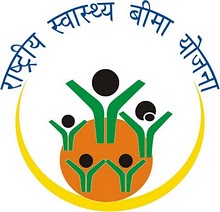Insurance in India covers both the public and private sector organisations. It is listed in the Constitution of India in the Seventh Schedule as a Union List subject, meaning it can only be legislated by the Central Government only.

Employees' State Insurance Corporation is one of the two main statutory social security bodies under the ownership of Ministry of Labour and Employment, Government of India, the other being the Employees' Provident Fund Organisation. The fund is managed by the Employees' State Insurance Corporation (ESIC) according to rules and regulations stipulated in the ESI Act 1948.

Rashtriya Swasthya Bima Yojana is a government-run health insurance programme for the Indian poor. The scheme aims to provide health insurance coverage to the unrecognised sector workers belonging to the BPL category and their family members shall be beneficiaries under this scheme. It provides for cashless insurance for hospitalisation in public as well as private hospitals. The scheme started enrolling on April 1, 2008 and has been implemented in 25 states of India. A total of 36 million families have been enrolled as of February 2014. Initially, RSBY was a project under the Ministry of Labour and Employment. Now it has been transferred to Ministry of Health and Family Welfare from April 1, 2015
Mahindra & Mahindra Financial Services Limited (MMFSL) is an Indian rural non-banking financial company headquartered in Mumbai. It is amongst the top tractor financers in India, with 1000+ offices across the country.

Agriculture in India is highly susceptible to risks like droughts and floods. It is necessary to protect the farmers from natural calamities and ensure their credit eligibility for the next season. For this purpose, the Government of India introduced many agricultural social insurances throughout the country, the most important one of them being Pradhan Mantri Fasal Bima Yojana.

Murugappa Group is an Indian conglomerate founded in 1900. The Group has 28 businesses including nine companies listed on the NSE and the BSE. Headquartered in Chennai, the major companies of the Group include Carborundum Universal Ltd., Cholamandalam Financial Holdings Ltd., Cholamandalam Investment and Finance Company Ltd., Cholamandalam MS General Insurance Company Ltd., Coromandel International Ltd., Coromandel Engineering Company Ltd., EID Parry (India) Ltd., Parry Agro Industries Ltd., Shanthi Gears Ltd., Tube Investments of India Limited., Net Access India Ltd and Wendt (India) Ltd.

Tube Investments of India Limited is an Indian engineering and manufacturing company that specializes in bicycles, metal formed products, and chains. It is based in Chennai and a part of Murugappa Group. It was incorporated as TI Cycles of India Limited in 1949, as a joint venture company.

Pradhan Mantri Jan Dhan Yojana is a financial inclusion program of the Government of India open to Indian citizens, that aims to expand affordable access to financial services such as bank accounts, remittances, credit, insurance and pensions. This financial inclusion campaign was launched by the Prime Minister of India Narendra Modi on 28 August 2014. He had announced this scheme on his first Independence Day speech on 15 August 2014.
Pradhan Mantri Suraksha Bima Yojana is a government-backed accident insurance scheme in India. It was originally mentioned in the 2015 Budget speech by Finance Minister Late Arun Jaitley in February 2015. It was formally launched by the Prime Minister Narendra Modi on 8 May in Kolkata.
Pradhan Mantri Jeevan Jyoti Bima Yojana is a Government-backed Life insurance scheme in India. It was originally mentioned in the year 2015 Budget speech by the then-Finance Minister, late Arun Jaitley in February 2015. It was formally launched by Prime Minister Narendra Modi on 9 May in Kolkata. As of May 2015, only 20% of India's population has any kind of insurance, this scheme aims to increase the number.
The Tamil Nadu State Apex Co-operative Bank, also known as TNSC Bank, is an Indian cooperative banking company headquartered in Chennai. It was incorporated in 1905 as an urban cooperative bank. As of 2015, TNSC Bank had 46 branches in Chennai. TNSC Bank coordinates India's entire short-term cooperative credit structure.
Pradhan Mantri Krishi Sinchai Yojana is a national mission to improve farm productivity and ensure better utilization of the resources in the country. The budget of ₹53 billion (US$660 million) in a time span of one year 2015-2016 has been allocated to this scheme. The decision was taken on 1 July 2015 at the meeting of Cabinet Committee on Economic Affairs, approved with an outlay of 50000 crore for period of 5 years.

Mahatma Jyotiba Phule Jan Arogya Yojana, previously Rajiv Gandhi Jeevandayee Arogya Yojana (RGJAY), is a Universal health care scheme run by the Government of Maharashtra for the poor people of the state of Maharashtra who holds one of the 4 cards issued by the government; Antyodaya card, Annapurna card, yellow ration card or orange ration card. The scheme was first launched in 8 districts of the Maharashtra state in July 2012 and then across all 35 districts of the state in November 2015. It provides free access to medical care in government empanelled 488 hospitals for 971 types of diseases, surgeries and therapies costing up to Rs.1,50,000 per year per family. As of 17 January 2016, around 11.81 lakh procedures amounting to Rs.1827 crore have been performed on patients from 7.13 lakh beneficiary families which includes over 7.27 lakh surgeries and therapies. The scheme is called successful amid some allegations of hospitals directly or indirectly causing patients to incur out-of-pockets expenses on some part of the treatment.

The Pradhan Mantri fasal bima yojana (PMFBY) launched on 18 February 2016 by Prime Minister Narendra Modi is an insurance service for farmers for their yields. It was formulated in line with One Nation–One Scheme theme by replacing earlier two schemes National Agricultural Insurance Scheme (NAIS) and Modified National Agricultural Insurance Scheme (MNAIS) by incorporating their best features and removing their inherent drawbacks (shortcomings). It aims to reduce the premium burden on farmers and ensure early settlement of crop assurance claim for the full insured sum.

Care Health Insurance Limited is an Indian health insurance company established in July 2012. It is part of the Religare Group and a direct subsidiary of Religare Enterprises. Kedaara Capital is a co-promoter of the company. Care Health Insurance is headquartered in Gurgaon, Haryana, and operates out of 158 offices across India with 8500+ employees.

Vakrangee Limited is a technology company based in Mumbai, India that provides banking, insurance, e-governance, e-commerce, and logistics services. The company is one of the main providers of the software and equipment for voter id cards and Aadhaar cards.

Cholamandalam Investment and Finance Company Limited (CIFCL) is a financial and investment service provider in India. It is headquartered in Chennai and has 1029 branches across the country. It is one of the 28 businesses under the Murugappa Group. It employees over 7,000 employees and also has about 16,000 people who assist in various business activities, with the majority being in smaller towns.
The Twelfth Five Year plan for health services in India covering 2012-2017 was formulated based on the recommendation of a High Level Experts Group (HLEG) and other stakeholder consultations. The long-term objective of this strategy is to establish a system of Universal Health Coverage (UHC) in the country. Key points include:
- Substantial expansion and strengthening of public sector health care system, freeing the vulnerable population from dependence on high cost and often unreachable private sector health care system.
- Health sector expenditure by central government and state government, both plan and non-plan, will have to be substantially increased by the twelfth five-year plan. It was increased from 0.94 per cent of GDP in tenth plan to 1.04 per cent in eleventh plan. The provision of clean drinking water and sanitation as one of the principal factors in control of diseases is well established from the history of industrialized countries and it should have high priority in health related resource allocation. The expenditure on health should increased to 2.5 per cent of GDP by the end of Twelfth Five Year Plan.
- Financial and managerial system will be redesigned to ensure efficient utilization of available resources and achieve better health outcome. Coordinated delivery of services within and across sectors, delegation matched with accountability, fostering a spirit of innovation are some of the measures proposed.
- Increasing the cooperation between private and public sector health care providers to achieve health goals. This will include contracting in of services for gap filling, and various forms of effectively regulated and managed Public-Private Partnership, while also ensuring that there is no compromise in terms of standards of delivery and that the incentive structure does not undermine health care objectives.
- The present Rashtriya Swasthya Bima Yojana (RSBY) which provides cash less in-patient treatment through an insurance based system should be reformed to enable access to a continuum of comprehensive primary, secondary and tertiary care. In twelfth plan period entire Below Poverty Line (BPL) population will be covered through RSBY scheme. In planning health care structure for the future, it is desirable to move from a 'fee-for-service' mechanism, to address the issue of fragmentation of services that works to the detriment of preventive and primary care and also to reduce the scope of fraud and induced demand.
- In order to increase the availability of skilled human resources, a large expansion of medical schools, nursing colleges, and so on, is therefore necessary and public sector medical schools must play a major role in the process. Special effort will be made to expand medical education in states which are under-served. In addition, a massive effort will be made to recruit and train paramedical and community level health workers.
- The multiplicity of Central sector or Centrally Sponsored Schemes has constrained the flexibility of states to make need based plans or deploy their resources in the most efficient manner. The way forward is to focus on strengthening the pillars of the health system, so that it can prevent, detect and manage each of the unique challenges that different parts of the country face.
- A series of prescription drugs reforms, promotion of essential, generic medicine and making these universally available free of cost to all patients in public facilities as a part of the Essential Health Package will be a priority.
- Effective regulation in medical practice, public health, food and drugs is essential to safeguard people against risks and unethical practices. This is especially so given the information gaps in the health sector which make it difficult for individual to make reasoned choices.
- The health system in the Twelfth Plan will continue to have a mix of public and private service providers. The public sector health services need to be strengthened to deliver both public health related and clinical services. The public and private sectors also need to coordinate for the delivery of a continuum of care. A strong regulatory system would supervise the quality of services delivered. Standard treatment guidelines should form the basis of clinical care across public and private sectors, with the adequate monitoring by the regulatory bodies to improve the quality and control the cost of care,
The Department of Agriculture and Farmers' Welfare (DA&FW) is one of the three constituent department of Ministry of Agriculture and Farmers' Welfare, the other two being Department of Agriculture Research and Education (DARE) and Department of Animal Husbandry and Dairying. The Department is headed by Minister of Agriculture and Farmers' Welfare.











